21st-22nd November 1918 Thursday and Friday
Allies Betrayed by American Thefts
All material produced or reproduced here and throughout this work is the sole copyright of the author and the family of Doctor D.C.M. Page MC.
“During the next few days the weather became much colder, and on the 21stNov. 22½ degrees of frost were registered. The air was beautifully clear, however, and one soon got accustomed to the intense cold. Winter kit arrived to be issued to the men. This consisted of fur caps, leather jerkins, large leather coats lined with sheepskin, fingerless gloves, thick stockings, and the special Shackleton boots to prevent frostbite.
About this time, too, the A.S.C. stores at Obozerskaya were being continually broken into at night, and the goods therein pilfered. Rum, whisky, port etc. were the goods usually stolen, although many sacks of flour, and cases of jam etc. went missing. These thefts were eventually traced to the American sentries, who were supposed to guard the place at night! They were even caught fraternising with the Bolos at night, and selling the stolen goods at a high price. What noble Allies we have! My room was broken into too, and several personal articles and some medical stores stolen. Even the ambulance train was not immune for several mattresses and bolsters were removed at night from one of the cars.”
Find out about our connection with Dr Page and an introduction to his diary here
19th November 1918 Tuesday
мы поздравляем вас (We congratulate you)
All material produced or reproduced here and throughout this work is the sole copyright of the author and the family of Doctor D.C.M. Page MC.
“On Tuesday 19th I was present at a very interesting ceremony at H.Q. Mess. The three head foresters had come over to congratulate Col. Lucas on the success of the Allies in France and elsewhere. They were gorgeously arrayed in full-dress uniforms with small silver daggers at their sides, and many brilliant decorations on their breasts.
Speeches were made, and the healths of Russia and the Allies were drunk in port.”
Find out about our connection with Dr Page and an introduction to his diary here
18th November 1918 Monday
Shell Shock from a Pistol Shot?
All material produced or reproduced here and throughout this work is the sole copyright of the author and the family of Doctor D.C.M. Page MC.
“The next day the A.D.M.S. wired me to send Capt. Jones forward to Verst 455 to relieve the American doctor, who had developed ‘shell-shock’ when somebody fired a Verey pistol one night!”
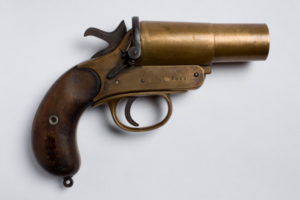
A 1916 Pistol, 1976_448 Photo from Black Country Museums via CC https://www.flickr.com/photos/blackcountrymuseums/4882055850
The Verey pistol (also Very) was named after its American inventor Edward Wilson Very who was a naval officer. Although his name was spelled without an ‘e’ both spellings are used for his invention.
It wasn’t a weapon but was used for firing warning flares and also used to light up an area like no man’s land or enemy trenches.
It has on occasions been used as a weapon and at close range it was a formidable one, similar to having a firework shot at you at high velocity.
Shell shock in the modern day is more commonly known as post-traumatic stress disorder (PTSD). It was first written about in The Lancet in 1915 by Charles Myers consultant psychologist with the British Army. In theory however throughout most of the war the British Army merely looked on shell shock as lack of moral fibre, cowardice or just plain shirking.
Find out about our connection with Dr Page and an introduction to his diary here
17th November 1918 Sunday
Frustration and Conflict
All material produced or reproduced here and throughout this work is the sole copyright of the author and the family of Doctor D.C.M. Page MC.
“On Sunday, the 17th, Capt. Jones, the new M.O. Ambulance Train, and I went up the line on a tour of inspection. We did not go on an engine, but by special train. We went right forward to Verst 455, and found everything very quiet there. A company of the King’s Liverpool Regiment was holding the front position, which consisted of one or two Russian houses and three British-built blockhouses situated in a clearing in the dense forest. The railway ran through the clearing, and on through No Man’s Land towards Petrograd. One could see nothing of the Bolo. positions, as the railway took a bend just beyond our front post. I found no Medical Officer at Verst 455, but there were three – 2 Americans and 1 French – back at Verst 466, who all complained of having nothing to do. When I suggested to the Americans that one of them should be forward at Verst 455, they objected strongly, stating that the firing line was no place for a doctor, and that when British troops were forward a British doctor should be forward too.
I immediately reported the matter to the A.D.M.S., and at the same time sent in my resignation – or rather applied to be relieved of my present post (see Appendix D*).
I also interviewed Col. Lucas when I got back to Obozerskaya, who immediately sent orders up to Verst 466, for one of the American doctors to go forward to Verst 455 for duty.”
*(Appendix D will be published later in the diary)
The arrangements for chain of command with the North Russian Expeditionary Force were that the British would control the whole operation, so all other countries’ contributing armies would take orders from the British high command under General Ironside.
A common complaint from American personnel was that they objected to taking orders from the British officers whom they regarded as treating them badly and with disrespect, something that we will encounter later in the diary as the resentment turned to crime. The misunderstandings were probably as much due to the differences in culture as to any bad treatment although the problem was ingrained from the start under General Poole. Poole had an authoritarian style and ruled more like a colonial governor with a certain lack of sensitivity than might have been needed in such a situation. He had been recalled and replaced by Ironside with the intent of improving that situation.
Douglas had found it increasingly frustrating that the Americans were so reluctant to obey orders from him as although he was the Senior Medical Officer there wasn’t much he could do if a foreign military man refused orders. His frustration boiled over into a request to be relieved.
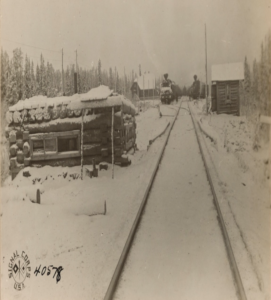
This picture taken on 15thNovember 1918 is of verst 455. The only name for this clearing in the forest complete with passing loops denoting that the position is 455 versts (a verst = appx 0.66 mile or 1.1 kms) from the original measuring point in the south. On the left is one of the 3 British built blockhouses. They were built from massive logs with walls about a metre thick to withstand enemy fire.
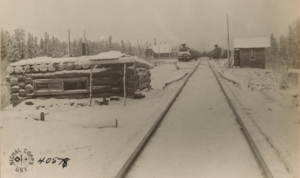
This is the original view which gives the impression of a broad gauge track. There is no evidence that the railway was built with anything other than the normal 5 ft “Russian Gauge” The Railway was begun in 1893 and completed by 1897 by which time gauging agreements would adhere to the 5ft track gauge.
Find out about our connection with Dr Page and an introduction to his diary here
14th November 1918 Thursday
The RAMC Relieve the Americans at the Hospital
All material produced or reproduced here and throughout this work is the sole copyright of the author and the family of Doctor D.C.M. Page MC.
“The train bringing the incoming party of R.A.M.C. men arrived at 2.30 on Thursday morning, the 14thNovember. It was snowing hard at the time, and I had a cold job getting them all sorted out, and settled down temporarily. They were from 82 C.C.S. and were under Capt. Kennifrick. Lt Woods, the quartermaster, came up with them to do the taking over, and I was glad that he came too. I found that they had left their rations and kit behind at Isako Gorka, but I phoned to the R.T.O. there, who sent it up at once by special engine.”
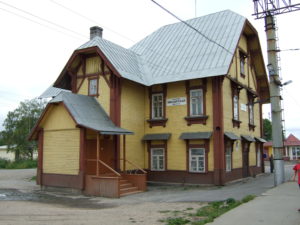
Modern view of Oboserskaya station. Photo by Paramecium via Creative Commons https://commons.wikimedia.org/wiki/File:Oboserskaja.jpg
Find out about our connection with Dr Page and an introduction to his diary here
13th November 1918 Wednesday
An Obnoxious Pile
All material produced or reproduced here and throughout this work is the sole copyright of the author and the family of Doctor D.C.M. Page MC.
“On Wednesday 13thNovember, I received a wire from the A.D.M.S. which was as follows:- ‘One officer, fourteen other ranks R.A.M.C. proceed evening train 13thObozerskaya area. They will take over charge detention hospital Obozerskaya.’ I was astounded when I read this, and so was Capt. Rosenfeldt, for there was nothing said about what was to be done with Rosenfeldt and his men, at present running the hospital. Still, I thought that sooner or later the A.D.M.S. would make a change, as the hospital was in such a filthy state, and was so badly run by Rosenfeldt. I immediately wired off to the A.D.M.S as follows: ‘Please wire instructions as to disposal of American Ambulance unit here, Urgent.’ The A.D.M.S.’s reply to that wire was: ‘Use as ambulance not as detention hospital,’ which reply helped me such a lot! I had now to find accommodation somewhere for Rosenfeldt and his men and suggested to him that he should move into the school at the Forestry Village temporarily. This he refused to do without consulting his superior officer! (I thought I was that distinguished gentleman!) Then a Capt. Pile, a most obnoxious Yankee M.O. arrived on the scene, and gave orders to Capt. Rosenfeldt to repair to box cars which were standing empty on the line outside the hospital. There were no stoves in these cars, and as it was snowing heavily, and very cold, I tried to impress upon Capts. Pile, and Rosenfeldt the absurdity of putting men into them in such weather, when they had the chance of good billets indoors, but they wouldn’t listen to me. So into the box cars they went, and when both British and American H.Q. heard about this I got the blame for putting them into such a plight, but was able to clear myself satisfactorily. The whole thing was originally the fault of our A.D.M.S. for not first of all consulting with American Medical H.Q. as to the disposal of Rosenfeldt and party.”
Find out about our connection with Dr Page and an introduction to his diary here
12th November 1918 Tuesday
News of the Armistice Trickles Through and Turner Teased
All material produced or reproduced here and throughout this work is the sole copyright of the author and the family of Doctor D.C.M. Page MC.
“We didn’t get news of the Armistice being signed till Tuesday 12th. The news came per the R.A.F. wireless, and I helped the R.A.F. mess to celebrate the occasion at night. Almost every officer at Obozerskaya was in the R.A.F. Mess that night. Major Turner* came in for a lot of teasing! He had his beard pulled, pins stuck into him, and water emptied down his neck! He was finally bundled out into the snow!”
News of the Armistice had yet to be confirmed with all ranks. On the 11th an American soldier Charles Brady** reported that a patrol from Obozerskaya had three men killed and several injured. Northern Russia would remain a very dangerous place for Allied troops to be in, for the foreseeable future. Brady states that they finally got a notice of Armistice on the 14th.
* Major Turner was the Roger Casement lookalike that requires further investigation by us. If anyone can help please let us know in the comments. From the way he was treated we wonder if he really was a major or whether this was a nickname.
** Diary, July 1918-March 1919 from the Charles Brady Ryan papers, 1916-1919 [Folder 2, Item 1]
Find out about our connection with Dr Page and an introduction to his diary here
11th November 1918 Monday
The Central Powers Defeated as Armistice is signed in France, but in Russia the Fighting Continues.
All material produced or reproduced here and throughout this work is the sole copyright of the author and the family of Doctor D.C.M. Page MC.
“On Monday 11th Nov. our planes had a busy day in spite of the disagreeable weather conditions. It was wet and very cold. Millar, the flight-commander, crashed at Verst 455 but wasn’t hurt, and somebody else dropped two bombs into the lake, which circumstance put the wind up everybody!”
On this day the guns on the Western Front and most other fronts ceased their relentless roar. The World had been plunged into a turmoil such as it had never before experienced. On July 28th 1914 a young Serbian student shot and killed Archduke Franz Ferdinand, heir apparent to the throne of the Austro-Hungarian Empire and his wife whilst on a visit to Sarajevo. The resulting domino effect saw most of Europe gradually sliding into an unstoppable nightmare that would last for four years and four months. Some skirmishes did continue in some of the remoter theatres of the war such as Mozambique and Palestine but the “war to end all wars” for most people ceased at 11am French time on the 11thNovember 1918.
Winston Churchill at this point in history was the British Minister for Munitions after having had a chequered record during the war, resigning after being heavily blamed for his role in the massacres in the Dardenelles. Gallipoli’s blood soaked beaches had seen the deaths of 250,000 troops and Churchill was forced to resign from Government in November 1915. Days later he took himself off to the trenches assuming the rank of Lt. Colonel and commanding the 6thBattalion Royal Scots Fusiliers. Although his unit was not involved in direct fighting at the time, Churchill himself visited the front line no less than 36 times, cheating death more than once. It was obvious that he was trying to expunge his reputation from the disasters of Turkey.
He returned to Parliament to more criticism. ‘You will one day discover that the state of mind revealed in (your) letter is the reason why you do not win trust even where you command admiration. In every line of it, national interests are completely overshadowed by your personal concern.’, was David Lloyd George’s assessment. Nevertheless, Churchill returned to Government in July 1917 as Minister of Munitions, but it was events taking place in Russia that would occupy his attention as it did through most of his life.
The Revolutions that took place in Russia from April 1917 and again in October that year brought fear of a destabilising situation. The communist Bolsheviks had seized power in Russia and fearing the spread of communism throughout war torn Europe Churchill felt he must do anything in his power to check its proliferation.
For the men sent to fight the cause against Bolshevism, they did not hear about the Armistice until the following day, during which time more casualties were sustained. They could have been forgiven for thinking that they would immediately lay down their arms at the news that the war had ended. From the high command downwards they waited expectantly for the order to return home. This order never came and the fight went on. Douglas and his comrades would remain in Russia to fight Churchill’s (and others’) undeclared war against communism. This was a war that many would ask, “Why are we here”? It was seen as an internal conflict. If Russians wanted a Bolshevik government then so what? That’s their business why should it bother us? Churchill took a wider view and by those who agreed with him managing to convince the United States to assist they would remain there for the months to come.
Find out about our connection with Dr Page and an introduction to his diary here
8th November 1918 Friday
Tour of Inspection
All material produced or reproduced here and throughout this work is the sole copyright of the author and the family of Doctor D.C.M. Page MC.
“On Friday, the 8th, I had a long day chasing around with Col. Carroll, the O.C., L. of C.,* and Major Turner, the Camp Commandant. We were accompanied by two other officers, and Sgt. Lofthouse, the new Sanitary Sergeant. We went via the aerodrome to the village of Malaturka on the lake in the heart of the forest about 2 miles from Obozerskaya. This lake is a lovely sheet of water – 3 miles long by about ½ mile broad – and the small village of about thirty houses lies on the north side. On the south side is a large fish-curing factory, where work has ceased since the Revolution. We crossed the lake on a raft, and selected sites for billets etc. for troops. We then walked across the fields to the Forestry Village, and then back to Obozerskaya. There was a railway smash up the line at night. The annexe train ran into another train, killing one man, and injuring two others.”
* O.C. Officer Commanding, L of C. Lines of Communication.
Colonel Jock Carroll an old campaigner recently in charge of a brigade in France and now posted by General Ironside to the Dwina front.
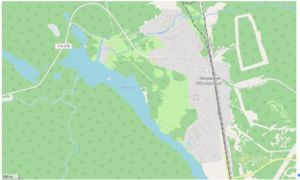
(c) OpenStreetMap contributors
Modern map showing the lake and Oberserskaya. There is no sign of the defunct fish factory these days, the southern shore is completely given over to forest right up to the shoreline.
Find out about our connection with Dr Page and an introduction to his diary here
6th November 1918 Wednesday
Hope for The End of The War in Europe?
All material produced or reproduced here and throughout this work is the sole copyright of the author and the family of Doctor D.C.M. Page MC.
“On Wednesday night, Nov. 6th, we heard per wireless that Turkey and Austria were out of the war, and that Germany was breaking. We were all greatly cheered up over this as we hope to get out of this hole as soon as Peace is signed). (What a hope we had!)”
After over 4 years of relentless fighting with millions dead all over the world but especially in Europe, protagonists were looking for an end. Russia on the side of the Allies had withdrawn in 1917, now Austria and Turkey had pulled out three days previoulsy. This was the break-up of the Central Powers with Austria the original perpetrators now giving in.
Germany although now with a population starving and demoralised was seeking a dignified withdrawal, but certainly not surrender. German politicians and senior military personnel were trying to negotiate a ceasefire, but on their own terms, but so far the allies were having none of it and an occupation of Germany was certainly on the cards.
Austria’s cessation of hostilities on November 3rdsparked the break-up of the Austro-Hungarian Empire and the centuries long Hapsburg dynasty domination of Europe came to an effective end. Turkey’s Ottoman Empire was also about to be broken up. It ceased in 1921/22 when Turkey entered into a new phase of its history eventually led by Mustapha Kemel as he re-organised Turkey into a modern republic that would begin new dialogue with the west.
Find out about our connection with Dr Page and an introduction to his diary here